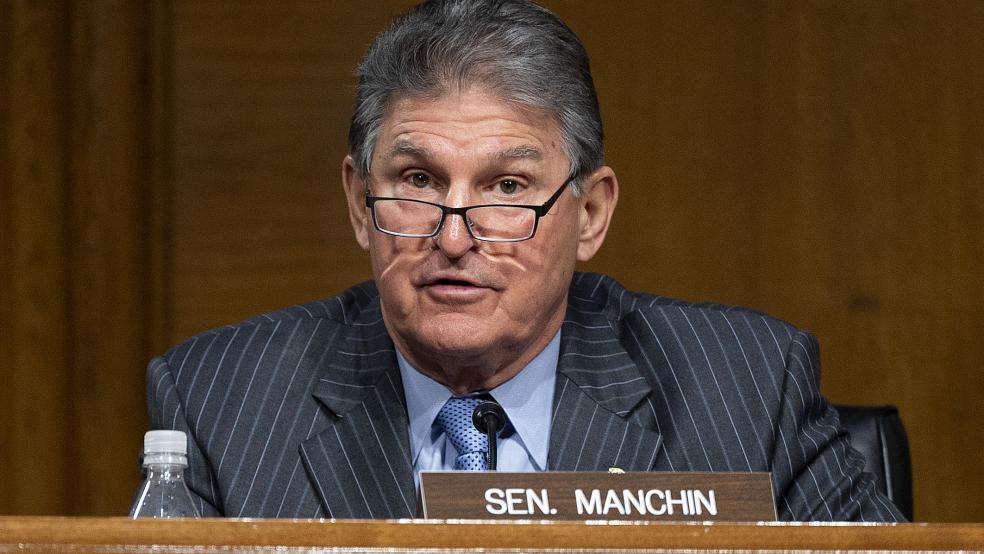Senate Democrat’s push to pass President Joe Biden’s $1.9 trillion Covid relief bill stalled out on Friday, leaving party leaders scrambling to ensure that they’d have the votes needed for passage. The uncertainty centered on whether Sen. Joe Manchin (D-WV), a key centrist, would support a last-minute Democratic agreement to change to the enhanced unemployment benefits provided in the bill or would instead back a Republican alternative.
The question led to an hours-long delay that left the fate of the entire package in doubt, raising questions about Democrats’ ability to enact legislation in an evenly divided Senate and with the party split between moderates and progressives.
The unemployment insurance question: Democrats reportedly had reached a deal Friday to scale back the supplemental federal unemployment payments provided by the aid package in response to concerns from moderates. Under the deal, the extra weekly payments would be lowered from $400 back to their current $300, but the benefit would be extended by a month, until the end of September. That amendment, offered by Sen. Tom Carper (D-DE), would also make $10,200 in unemployment insurance exempt from taxes to prevent jobless workers from getting hit with an unexpected year-end tax bill.
The White House backed the deal, but it quickly became apparent that the agreement was in peril, resulting in a prolonged delay in the Senate’s consideration of amendments to the Covid package while Democrats tried to resolve the standoff.
Manchin had expressed concerns that the unemployment benefits might deter jobless people from going back to work at a time when the economic recovery is poised to take off, and he reportedly was troubled by the tax exemption in the Democratic amendment. As a result, he was considering supporting a competing amendment from Sen. Rob Portman (R-OH) that would both cut the unemployment benefit to $300 and have it expire on July 18, earlier than the original end-of-August cutoff. Portman’s amendment also wouldn’t provide the tax exemption. Republicans say it would trim $128 billion from the overall cost of the package.
Roll Call reports that some business groups backed the Portman amendment, with the U.S. Chamber of Commerce and National Federation of Independent Business both saying that they would make it a “key vote” on their annual scorecard.
"There's bipartisan support for what Rob's trying to do. And Manchin's getting beat up by his side. They're trying to get him in line, so to speak. And he's trying to do the right thing," said Senate Minority Whip John Thune (R-SD). "He knows that the Portman amendment saves a lot of money and is better policy. But Democrats in his caucus obviously don’t want to give Republicans a bipartisan win on this."
The original August expiration of benefits is problematic because lawmakers are scheduled to be on recess then, raising concerns that they’d be unable to renew the program in a timely fashion if needed.
Why it matters: The boosted unemployment benefits are set to expire on March 14, and Democrats reportedly were concerned that the Portman amendment would require new negotiations with the House, threatening to delay passage past that deadline.
Minimum wage hike poised to be voted down: The Senate scramble on unemployment benefits started as lawmakers were launching their “vote-a-rama,” a lengthy process of voting on potentially dozens of the hundreds of amendments filed for the aid bill. The first amendment was from Sen. Bernie Sanders (I-VT), who forced a vote on proposal to raise the federal minimum wage from $7.25 to $15 an hour.
In a speech on the Senate floor, Sanders said lawmakers shouldn’t leave the decision to the Senate parliamentarian, who ruled last week that the wage hike didn’t comply with the reconciliation rules being used to pass the entire aid package. “It is an absurd process that we allow an unelected staffer, somebody who works for the Senate, not elected by anybody to make a decision as to whether 30 million Americans get a pay raise or not,” he said.
But eight Democrats joined with all Republicans to vote down the amendment. Those eight are Sens. Tom Carper and Chris Coons of Delaware, Maggie Hassan of New Hampshire, Angus King of Maine (an independent who caucuses with Democrats), Manchin, Jeanne Shaheen of New Hampshire, Kyrsten Sinema of Arizona and Jon Tester of Montana.
“It's possible that the Democrats who rejected Sanders' amendment support a minimum wage hike, but voted ‘no’ because they oppose it as part of COVID relief or respect the parliamentarian's ruling,” Axios’s Ursula Perano notes.
That vote was held open for hours, though, as talks dragged on about the unemployment benefits.
What’s next: Probably a lot more drama. If senators can strike a deal on the unemployment benefits — and that appears to be a big if at this point — the vote-a-rama will continue. Many or most of the votes will be meant to provide campaign fodder on hot button issues not related to the actual aid package. The process will take hours, but once it’s done Senate Democrats should be able to pass the relief package this weekend. It will then go back to the House, where Democrats will again be forced to face their intraparty divisions as they decide whether they can back the Senate-passed version of the bill.





